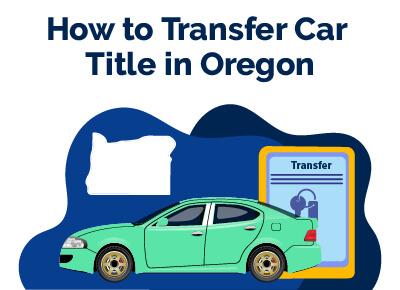How To Transfer a Car Title in Oregon
February 23, 2024


Chris is Head of Content for FindTheBestCarPrice and is based out of Philadelphia, PA. As a seasoned automotive industry analyst and car enthusiast, he ensures the highest level of quality across all our content and curates our picks for the best deals each month.
Chris studied information systems and marketing at Drexel University and writes about a wide range of topics ranging from car buying tips to troubleshooting common mechanical issues.
When he’s not thinking about cars, he likes to stay in with his dog and make an “attempt” to finish a crossword puzzle (he’s not quite at the Saturday/Sunday level…yet). As a former cheesemonger, Chris still has a “sharp” passion for all things cheese, and his fridge is always loaded with it!
Chris also has a passion for things that go fast, and drones are no exception. He spends some of his time writing for Dronesourced.
If you plan to buy or sell a car in Oregon, then you must know how to transfer the car title.
To transfer car titles in Oregon, you will need:
- the vehicle's original title
- to complete your application
- original copies of the bill of sale
- an odometer disclosure
- lien releases if applicable
- to pay the required fees
Some parts of Oregon also require that you conduct emission testing, and all applications for car title transfers in Oregon must be mailed to the DMV office.
Read on to learn more about how to transfer a car title in Oregon.
Key Takeaways
- To transfer a car title in Oregon, you must be a resident of the state and the vehicle must be loan-free.
- If there's a lien on the vehicle, you must initiate a lease release before transferring the title.
- Key documents you need to transfer the title including a bill of sale, odometer disclosure, use tax certificate, and VIN inspection.
- It costs between $101 and $192 to transfer the title depending on the vehicle's class, age, and fuel economy.
Table of Contents
- Key Takeaways
- Can You Transfer a Car Title in Oregon?
- What Are the Documents Required for a Car Title Transfer in Oregon?
- Do I Need an Odometer Reading to Transfer an Oregon Title?
- Do I Need to Pass an Emissions Test to Transfer My Vehicle Title in Oregon?
- How To Transfer Car Title in Oregon
- How To Transfer Car Title in Oregon for Inherited Vehicles
- How Much Does It Cost To Transfer a Title in Oregon?
- Conclusion
- Best Car Deals by Category
- Frequently Asked Questions
Can You Transfer a Car Title in Oregon?
You can transfer a car title in Oregon if you meet certain requirements.
Oregon has strict title transfer policies that limit the process of car title transfers to only residents of the state, and you can only transfer a car title if there is no loan on the vehicle.
If you intend to get a title for a car with loan records, you must pay off the loan to permit your transfer.
What Are the Documents Required for a Car Title Transfer in Oregon?
Here is a list of documents that you will need to transfer car titles in Oregon.
- The current title
- Bill of Sale
- Odometer Reading
- Manufacturer’s Certificate of Origin (MCO)
- Lien Release, if applicable
- DMV2U Form
- Title fee payment
Do I Need an Odometer Reading to Transfer an Oregon Title?
You do not need an odometer disclosure if your vehicle is:
- Not manufactured with an odometer
- 2010 model or older
- Not self-propelled; trailers and campers
- Has a GVW rating of over 16,000 pounds
- Class 1 All-Terrain Vehicles
Do I Need to Pass an Emissions Test to Transfer My Vehicle Title in Oregon?
In some cases, you will need to pass an emission test, especially if you are filling for a title transfer within the regions of Portland and Medford. The emission tests in this region are carried out every two years.
How To Transfer Car Title in Oregon
The basic steps include:
- Obtain the seller's title
- Lien releases
- Complete the application
- Provide documentation
- Pay the fees
- Notify the DMV with DMV2U
1. Title and Ownership
Obtain the seller's original title or ownership document. If the vehicle is new, you must have the manufacturer’s certificate of origin.
If the seller couldn’t provide a title because it was lost, a replacement title should be filed to enable you to transfer the title.
Replacement title applications for vehicles with a model year of 2011 or newer will need to submit an odometer disclosure.
Vehicles with a model year of 2010 or older will complete the replacement title application based on the information available on the Oregon record. If the vehicle is out-of-state, then the seller must get a replacement from the state before applying for an Oregon title.
2. Lien Release
After obtaining a title, you can confirm if there is a lien holder. In the event of one, get the lien release before applying for transfer. You can obtain a release of interest from the lienholder(s) if there is any.
In the event of a lien holder, you can ask them to handle the title transfer on your behalf while sending them the required documents, including a security interest holder letter.
The lienholder will complete your title transfer application and mail it to the DMV office. While you wait for your finalization of this process, you can apply for a temporary trip permit to allow you drive the car around while you wait for your title.
3. Complete Title Application
Then, complete the title application and registration. The title application form assumes that you are applying for a clear title, so don’t apply for this title if you are applying with a rebuilt or salvage vehicle.
The title application will include the:
- vehicle information
- owner’s contact details, and address
- total fee for the title application will be attached to the form, depending on the estimated fees you are paying.
4. Documentation
Provide the necessary documents for your title transfer. This includes a:
- bill of sale
- odometer disclosure
- use tax certificate
- vehicle identification number inspection, especially if it is an out-of-state “vehicle” title.
5. Pay Fees
All necessary fees must be paid at the completion and submission of the form. All documents and fees will be paid to the Department of Motor Vehicles (DMV) office or mailed to the following address:
Oregon DMV
1905 Lana Ave NE
Salem, OR 97314
The list of fees that you will have to pay for your title transfer in Oregon includes the following:
- Title Fee: $101-$192, depending on the vehicle's age, class, and fuel economy.
- VIN inspection fee: $7 for out-of-state or foreign titles.
- Late Fees: $25 within 31- 60 days after sale, $50 after 61 days of sale.
You must complete your title transfer within 10 days to avoid attracting penalties.
6. Use the DMV2U for Notification
Sellers should use the DMV2U center to notify the DMV within 10 days of the vehicle sale. You will retain ownership of the vehicle until the title transfer is completed.
There are quite a few factors that influence the process of title transfers. Special considerations include:
- inherited vehicle
- initiated by new residents
- any lien release, etc
How To Transfer Car Title in Oregon for Inherited Vehicles
Car title transfer as an inheritance in Oregon is only reserved for a few sets of people:
- Individuals named as co-owner or having a survivorship
- If the deceased estate is probated
- There is no named owner or probate on the estate
If an individual is named as the “survivor” of a co-owned vehicle, retitling can be done in the absence (death) of the primary title holder.
To do this, submit the following to the DMV:
- Current title certificate
- Death or obituary certificate as proof of death
- Proof of transaction
- Proof of payment of title application fees
If there is no named owner or probate on the estate, then you need a notarized inheritance affidavit. This should clearly state the awarded heir(s) of the vehicle.
How Much Does It Cost To Transfer a Title in Oregon?
Transferring a title in Oregon costs between $101 and $192. The accrued cost for transferring a title in Oregon depends on the car's overall weight, fuel economy, and class. In Oregon, electric cars have the highest title fees.
Here’s a list of fees for title transfers in Oregon for passenger vehicles and trucks (26,000 pounds GVWR or less):
- Vehicle model year of 1999 or older, light trailers, travel trailers, and buses: $101
- Vehicle model year of 2000 or newer, with 0-19 Combined MPG, heavy vehicle titles, ATVs, campers, motor homes: $101
- Vehicle year 2000 or newer, with 20-39 Combined MPG: $106
- Vehicle year 2000 or newer, has 40+ Combined MPG: $116
- Electric Vehicle: $192
Conclusion
Transferring your car title in Oregon isn’t an entirely hard process. The fees might be slightly higher than what is obtainable in other states, but you have to ensure that you don’t make mistakes during the application process.
Make sure that you are handed over the title of the car if you are not buying a new vehicle, and always alert the authorities if you are worried about the authenticity of the dealer/seller.
To learn about the process of transferring car titles in other states, check out our comprehensive guides.
Best Car Deals by Category
Frequently Asked Questions
Can a non-resident register a car in Oregon?
No. Non-residents are not permitted to register cars in Oregon. Car registrations are only limited to Oregon residents or those who have lived in Oregon for at least six months and are consistent with your tax records.
What is the penalty for a late title transfer in Oregon?
The penalty for a late title transfer in Oregon is $25 if you delay your title transfer for 31 - 60 days. Delays from 61 days and above attract a $50 penalty fee.
How much does it cost to transfer a title in Oregon?
The average cost of all title transfer fees is between $101 and $192 depending on vehicle details.
How do I report selling my car to the Oregon DMV?
Car sellers should use DMV2U to submit a Notice of Sale online. You can also call the DMV to request a mailed form or submit it in person at the DMV.
How long does it take to transfer a car title in Oregon?
Dealer titles typically take 4 weeks to process whereas other titles take 2-4 weeks.
Do I keep my license plate when I sell my car in Oregon?
Yes, you can remove your license plates when selling your car.
Posted in Car Buying Tips, Car Troubleshooting |




